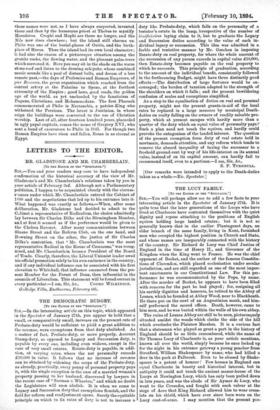THE DEMOCRATIC BUDGET.
[To THE EDITOR OF THE "SPECTATOR."] SIR,—In the interesting article on this topic, which appeared in the Spectator of January 27th, you appear to hold that a small, or comparatively small, increase on the present rate of Probate-duty would be sufficient to yield a great addition to the revenue, were exemptions from that duty abolished. As a matter of fact, Probate-duty, or more properly, Account Stamp-duty, as opposed to Legacy and Succession duty, is payable by every one, including even widows, except in the case of very small estates. Estate-duty is payable, in addi- tion, at varying rates, where the net personalty exceeds £10,000 in value. It follows that no increase of revenue can be obtained by widening the scope of the Probate-duty, as already, practically, every penny of personal property pays it, with the single exception in the case of a married woman's property passing to her husband, discovered by lawyers in the recent case of " Surman. v. Wharton," and which no doubt the Legislature will soon abolish. It is when we come to Legacy and Succession duty that exemptions flourish, and the field for reform and readjustment opens. Surely the equitable principle on which to fix rates of duty is not to inci ease a duty like Probate-duty, which falls on the personalty of a testator's estate in the lump, irrespective of the number of beaficiaires laying claim to it, but to graduate the Legacy and Succession duties according to the value of each in- dividual legacy or succession. This idea was admitted in a feeble and tentative manner by Mr. Goschen in imposing Estate-duty on real property, for where the whole amount of the succession of any person exceeds in capital value 210,000, then Estate-duty becomes payable on the real property to which he succeeds. This principle of graduation, according to the amount of the individual benefit, consistently followed in the forthcoming Budget, might have three distinctly good effects :—The distribution of large fortunes would be en- couraged; the burden of taxation adapted to the strength of the shoulders on which it falls ; and the present bewildering confusion of scales and exemptions simplified.
As a step to the equalisation of duties on real and personal property, might not the present grants-in-aid of the local rates be replaced in a large measure by municipal Death- daties on realty falling on the owners of readily saleable pro- perty, which at present escapes with hardly more than a quarter of the duty which an equal value of personalty pays? Such a plan need not touch the squires, and hardly could provoke the antagonism of the landed interest. The question of the present exemption from duty of real estate held in mortmain, demands attention, and any reform which tends to remove the absurd inequality of taxing the successor to a freehold ground-rent by way of his life-interest on its annual value, instead of on its capital amount, can hardly fail to recommend itself, even to a partisan.—I am, Sir, &c.,
S. P. TURNBULL.
[Our remarks were intended to apply to the Death-duties taken as a whole.—En. Spectator.]






































 Previous page
Previous page